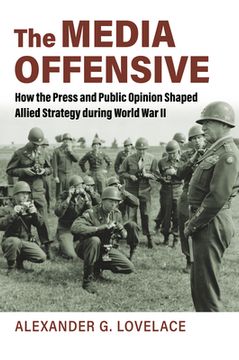Share
The Media Offensive: How the Press and Public Opinion Shaped Allied Strategy During World war ii
Alexander G. Lovelace
(Author)
·
University Press of Kansas
· Paperback
The Media Offensive: How the Press and Public Opinion Shaped Allied Strategy During World war ii - Lovelace, Alexander G.
Choose the list to add your product or create one New List
✓ Product added successfully to the Wishlist.
Go to My Wishlists
Origin: U.S.A.
(Import costs included in the price)
It will be shipped from our warehouse between
Thursday, July 04 and
Tuesday, July 16.
You will receive it anywhere in United Kingdom between 1 and 3 business days after shipment.
Synopsis "The Media Offensive: How the Press and Public Opinion Shaped Allied Strategy During World war ii"
World War II was a media war. President Franklin D. Roosevelt used the press to a great extent, of course, but as the war progressed, the media also came to influence commanders' decisions on the battlefield. Rescuing General Douglas MacArthur from the Philippines in deference to public opinion forced the Allies to divide the Pacific War between two competing theaters. Omar Bradley's concern over US public opinion convinced General Dwight D. Eisenhower to include Americans in the final assault against Axis forces in Tunisia. General George S. Patton Jr. raced across Sicily to gain media attention and British respect. General Mark Clark's hunger for publicity and the glory of capturing Rome allowed an entire German army to escape destruction. Negative media pressure and the fear of V-1 bombs damaging British morale provided the impetus for the breakout of Normandy and the unsuccessful attempt to liberate the Netherlands in the fall of 1944. British general Bernard Montgomery's remarks to the press during the Battle of the Bulge almost caused him to lose his command and created tremendous ill feelings among the Allies. Soon afterward, Eisenhower was forced to hold the dangerously exposed city of Strasbourg because of French public opinion. By V-E Day, even Eisenhower was attempting to get more publicity for American, as opposed to Allied, units. The Media Offensive offers a new way to understand military-media relations during World War II. The press and public opinion shaped not only how the conflict was seen but also how it was fought. Alexander Lovelace demonstrates that the US military repeatedly discovered that the best effects resulted from accurate news stories. Truthful news reporting--defined as news reporting that accurately depicts the events it describes--could not be created by the military or even the media but could only emerge through a free press searching for it. Lovelace recasts World War II in a new and unique fashion by placing media and public opinion at the center of battlefield decision-making. Unlike past scholarship on the media during World War II that focused on censorship, propaganda, or the adventure stories of war correspondents, The Media Offensive takes the historiography of war reporting in a new direction. In what could be called "the new history of war reporting," the focus is switched from how the military controlled reporters to how military decisions were shaped by the press.
- 0% (0)
- 0% (0)
- 0% (0)
- 0% (0)
- 0% (0)
All books in our catalog are Original.
The book is written in English.
The binding of this edition is Paperback.
✓ Producto agregado correctamente al carro, Ir a Pagar.

